Burt A. The Evolution of the British Empire and Commonwealth From the American Revolution
Подождите немного. Документ загружается.

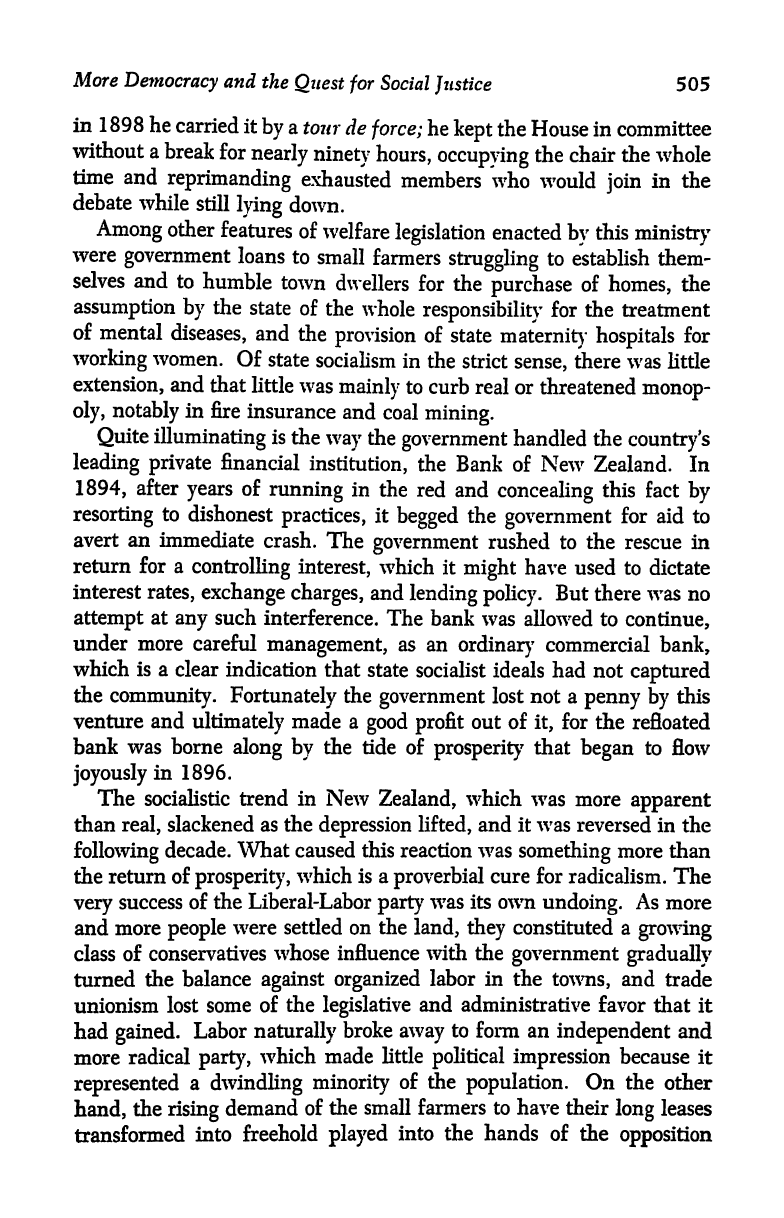
More
Democracy
and
the
Quest
for
Social
Justice
505
in
1 898
he
carried
it
by
a
tour
de
force;
he
kept
the
House
in committee
without
a
break
for
nearly
ninety
hours,
occupying
the chair the whole
time
and
reprimanding
exhausted
members
who would
join
in the
debate
while
still
lying
down.
Among
other
features
of
welfare
legislation
enacted
by
this
ministry
were
government
loans
to
small
farmers
struggling
to establish them-
selves and
to
humble
town
dwellers for the
purchase
of
homes,
the
assumption
by
the
state
of
the
whole
responsibility
for
the
treatment
of
mental
diseases,
and
the
provision
of
state
maternity
hospitals
for
working
women.
Of
state
socialism
in
the strict
sense,
there
was little
extension,
and
that
little
was
mainly
to curb real or threatened
monop-
oly, notably
in
fire
insurance
and
coal
mining.
Quite
illuminating
is
the
way
the
government
handled the
country's
leading
private
financial
institution,
the
Bank of New
Zealand.
In
1894,
after
years
of
running
in
the
red
and
concealing
this fact
by
resorting
to
dishonest
practices,
it
begged
the
government
for
aid to
avert
an
immediate
crash.
The
government
rushed to the
rescue
in
return for
a
controlling
interest,
which
it
might
have
used
to
dictate
interest
rates,
exchange
charges,
and
lending policy.
But
there
was
no
attempt
at
any
such
interference.
The bank
was
allowed to
continue,
under more careful
management,
as an
ordinary
commercial
bank,
which is a
clear
indication that
state socialist
ideals had not
captured
the
community. Fortunately
the
government
lost not a
penny by
this
venture and
ultimately
made a
good
profit
out
of
it,
for
the
refloated
bank
was
borne
along by
the tide of
prosperity
that
began
to
flow
joyously
in
1896.
The socialistic trend
in
New
Zealand,
which was more
apparent
than
real,
slackened
as the
depression
lifted,
and it was
reversed in the
following
decade.
What caused this
reaction was
something
more than
the return of
prosperity,
which is
a
proverbial
cure for
radicalism.
The
very
success
of the Liberal-Labor
party
was its own
undoing.
As
more
and
more
people
were settled
on
the
land,
they
constituted a
growing
class of
conservatives
whose influence
with the
government
gradually
turned
the balance
against
organized
labor in the
towns,
and
trade
unionism
lost some
of
the
legislative
and administrative
favor that
it
had
gained.
Labor
naturally
broke
away
to form an
independent
and
more
radical
party,
which made
little
political impression
because
it
represented
a
dwindling
minority
of die
population.
On the
other
hand,
the
rising
demand
of
the small farmers to have
their
long
leases
transformed
into freehold
played
into the
hands of the
opposition
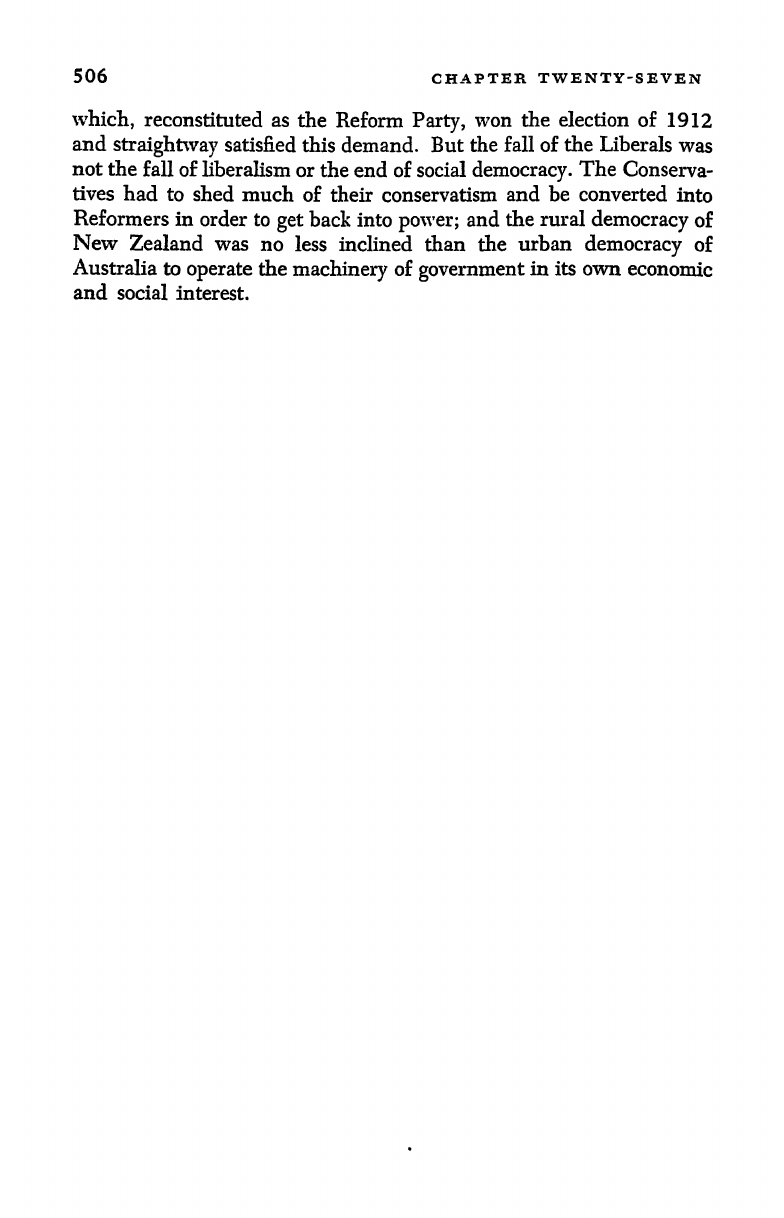
506
CHAPTER TWENTY-SEVEN
which,
reconstituted
as
the Reform
Party,
won the
election
of
1912
and
straightway
satisfied this demand.
But
the fall of
the
Liberals
was
not the
fall of
liberalism
or the
end
of social
democracy.
The
Conserva-
tives
had
to
shed much
of
their
conservatism
and be converted
into
Reformers
in
order to
get
back
into
power;
and
the rural
democracy
of
New
Zealand
was
no
less inclined than the
urban
democracy
of
Australia
to
operate
the
machinery
of
government
in its own
economic
and
social
interest.
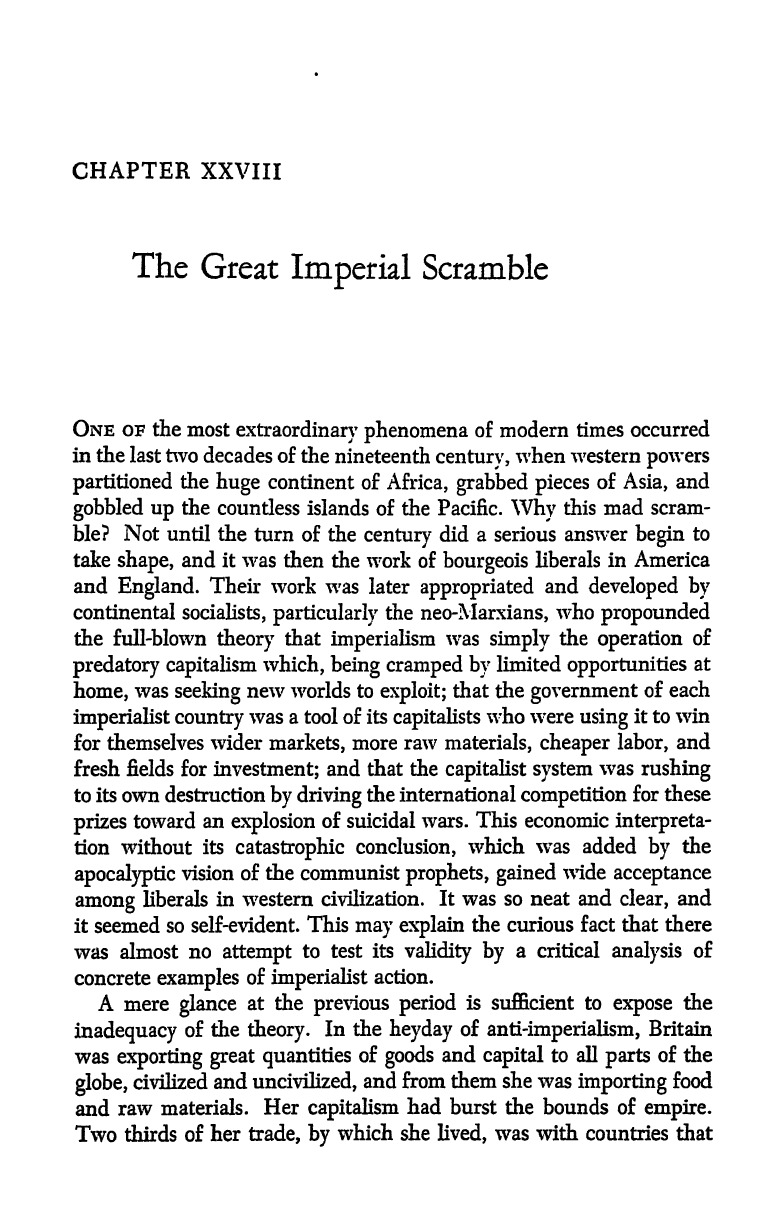
CHAPTER
XXVIII
The
Great
Imperial
Scramble
ONE
OF the
most
extraordinary phenomena
of modern
times occurred
in the
last
two
decades of
the
nineteenth
century,
when western
powers
partitioned
the
huge
continent
of
Africa,
grabbed
pieces
of
Asia,
and
gobbled
up
the
countless
islands of the
Pacific.
Why
this mad
scram-
ble?
Not until
the turn
of the
century
did
a
serious
answer
begin
to
take
shape,
and
it
was then
the work of
bourgeois
liberals
in
America
and
England.
Their
work was
later
appropriated
and
developed
by
continental
socialists,
particularly
the
neo-Marxians,
who
propounded
the full-blown
theory
that
imperialism
was
simply
the
operation
of
predatory capitalism
which,
being
cramped
by
limited
opportunities
at
home,
was
seeking
new
worlds to
exploit;
that
the
government
of
each
imperialist
country
was a tool of
its
capitalists
who
were
using
it to
win
for
themselves
wider
markets,
more
raw
materials,
cheaper
labor,
and
fresh fields for
investment;
and that the
capitalist
system
was
rushing
to
its
own
destruction
by driving
the
international
competition
for these
prizes
toward
an
explosion
of suicidal wars.
This economic
interpreta-
tion without
its
catastrophic
conclusion,
which
was
added
by
the
apocalyptic
vision
of the communist
prophets, gained
wide
acceptance
among
liberals
in
western civilization.
It was so neat and
clear,
and
it
seemed
so
self-evident.
This
may explain
the curious fact that
there
was
almost
no
attempt
to
test its
validity by
a
critical
analysis
of
concrete
examples
of
imperialist
action.
A mere
glance
at the
previous period
is sufficient to
expose
the
inadequacy
of
the
theory.
In
the
heyday
of
anti-imperialism,
Britain
was
exporting great
quantities
of
goods
and
capital
to
all
parts
of
the
globe,
civilized
and
uncivilized,
and from
them she
was
importing
food
and
raw
materials.
Her
capitalism
had burst the bounds of
empire.
Two
thirds
of
her
trade,
by
which
she
lived,
was with countries
that
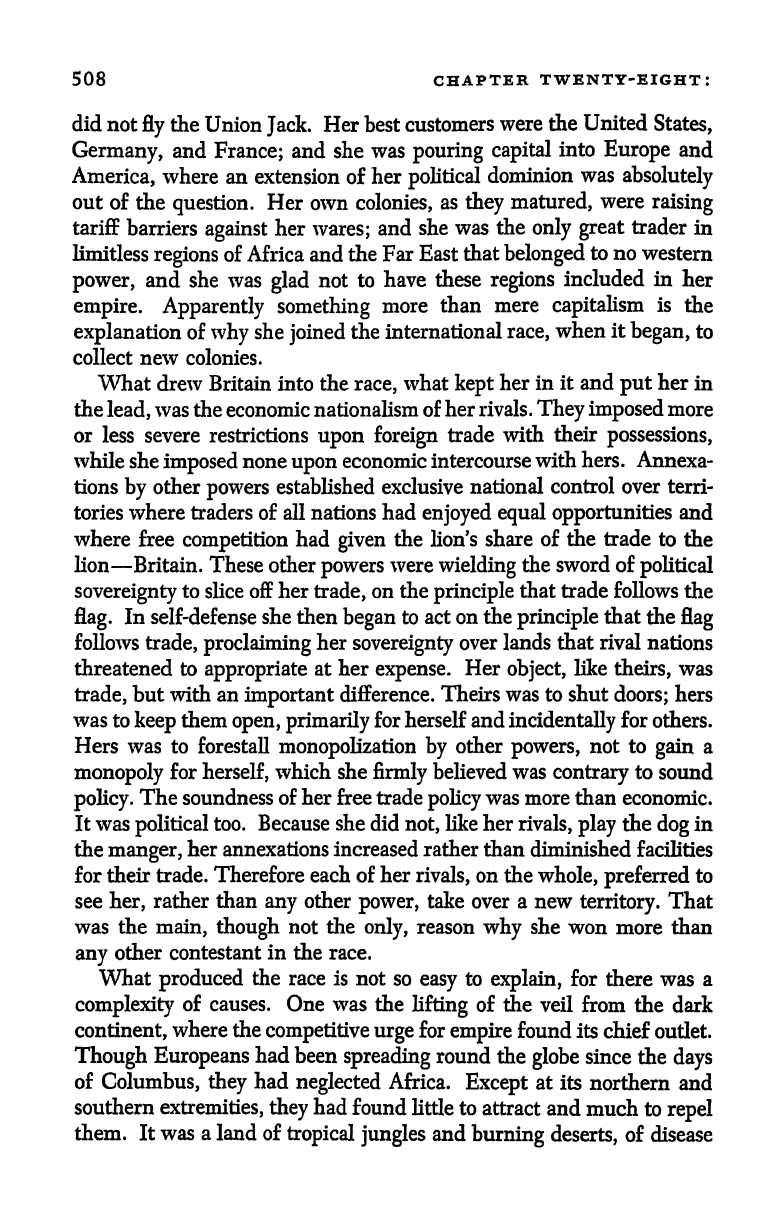
508
CHAPTER
TWENTY-EIGHT:
did
not
fly
the
Union
Jack.
Her
best
customers
were
the
United
States,
Germany,
and
France;
and
she
was
pouring
capital
into
Europe
and
America,
where an
extension
of
her
political
dominion
was
absolutely
out
of the
question.
Her
own
colonies,
as
they
matured,
were
raising
tariff
barriers
against
her
wares;
and
she
was
the
only great
trader
in
limitless
regions
of
Africa and
the Far East
that
belonged
to no
western
power,
and
she was
glad
not
to
have these
regions
included in
her
empire.
Apparently something
more
than
mere
capitalism
is
the
explanation
of
why
she
joined
the international
race,
when
it
began,
to
collect new
colonies.
What
drew Britain
into
the
race,
what
kept
her
in
it
and
put
her
in
the
lead,
was the economic
nationalism of
her
rivals.
They
imposed
more
or
less severe restrictions
upon foreign
trade
with
their
possessions,
while she
imposed
none
upon
economic
intercourse
with hers.
Annexa-
tions
by
other
powers
established exclusive
national
control over
terri-
tories
where
traders of all nations had
enjoyed
equal
opportunities
and
where
free
competition
had
given
the lion's
share of
die trade
to the
lion Britain. These other
powers
were
wielding
the sword of
political
sovereignty
to
slice
off her
trade,
on
the
principle
that trade follows
the
flag.
In self-defense
she then
began
to
act on
die
principle
that
the
flag
follows
trade,
proclaiming
her
sovereignty
over lands
that rival
nations
threatened to
appropriate
at her
expense.
Her
object,
like
theirs,
was
trade,
but
with an
important
difference.
Theirs was to shut
doors;
hers
was to
keep
them
open,
primarily
for
herself and
incidentally
for
others.
Hers was to forestall
monopolization by
other
powers,
not
to
gain
a
monopoly
for
herself,
which she
firmly
believed was
contrary
to
sound
policy.
The
soundness
of
her free trade
policy
was more than
economic.
It
was
political
too. Because she
did
not,
like her
rivals,
play
the
dog
in
the
manger,
her annexations
increased
rather
than
diminished facilities
for their
trade.
Therefore each of her
rivals,
on the
whole,
preferred
to
see
her,
rather
than
any
other
power,
take
over a new
territory.
That
was
the
main,
though
not
the
only,
reason
why
she won
more
than
any
other contestant
in
the race.
What
produced
the race
is
not
so
easy
to
explain,
for there
was
a
complexity
of causes.
One
was
the
lifting
of the
veil from
the
dark
continent,
where the
competitive
urge
for
empire
found its chief
outlet.
Though
Europeans
had
been
spreading
round
the
globe
since the
days
of
Columbus,
they
had
neglected
Africa.
Except
at
its
northern and
southern
extremities,
they
had
found
little
to
attract and
much
to
repel
them. It
was a
land of
tropical
jungles
and
burning
deserts,
of
disease
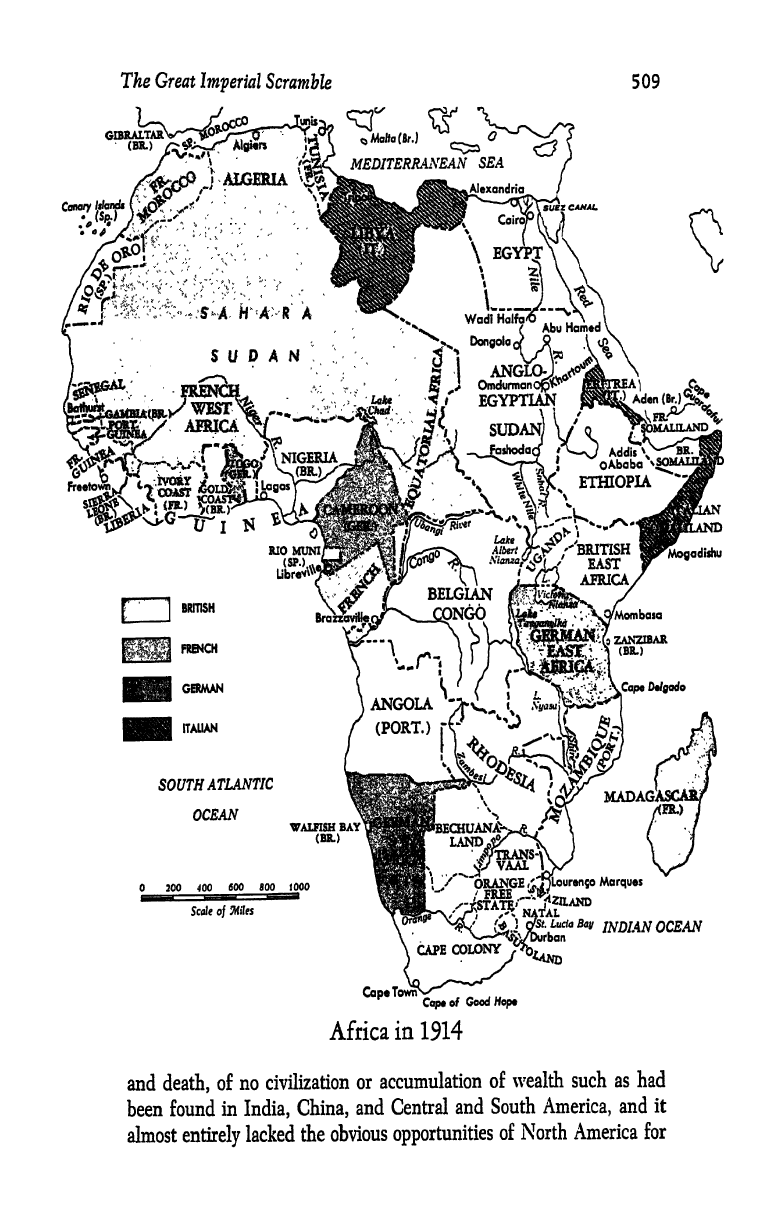
The
Great
Imperial
Scramble
509
GIBRALTAR
(BR.)
200 400
600
SOO 1000
I
I
Scale
of
ftita
irenfo
Marques
INDIAN
OCEAN
Africa
in
1914
and
death,
of
no
civilization
or
accumulation
of
wealth such
as had
been
found
in
India,
China,
and
Central
and
South
America,
and
it
almost
entirely
lacked
the
obvious
opportunities
of
North
America
for
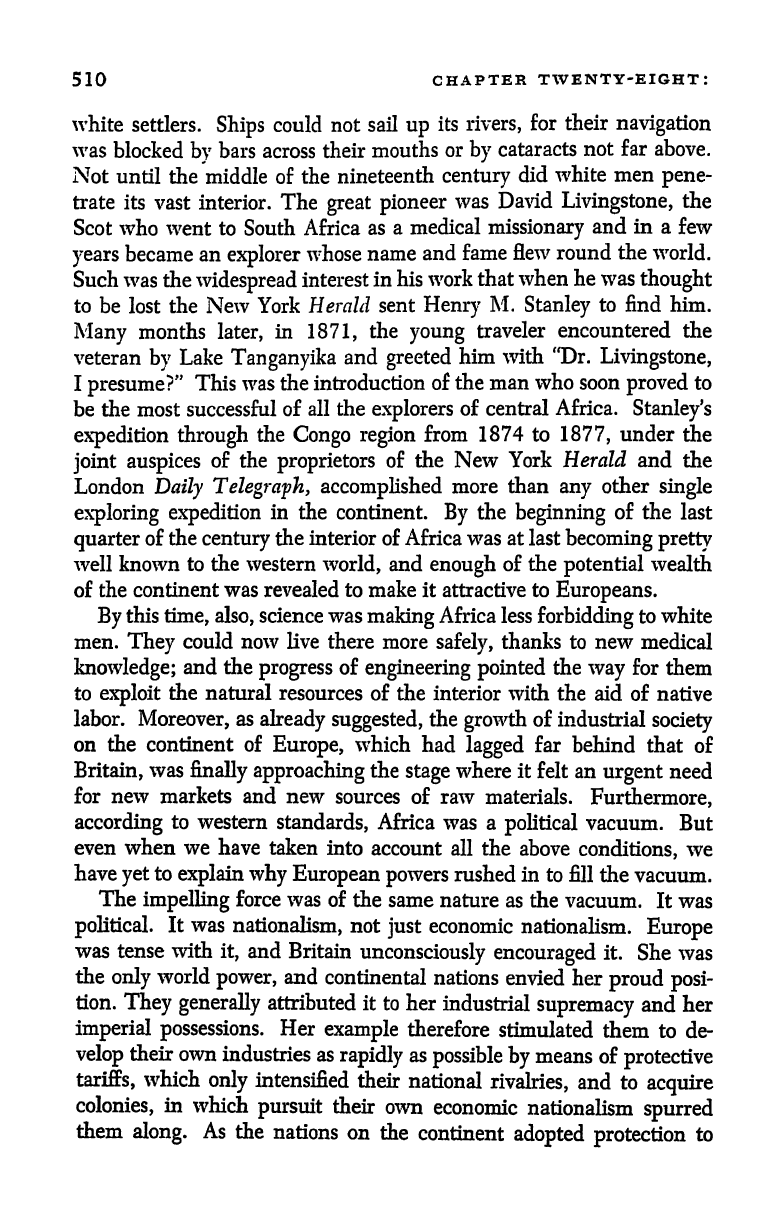
510
CHAPTER
TWENTY-EIGHT:
white
settlers.
Ships
could
not
sail
up
its
rivers,
for
their
navigation
was
blocked
by
bars across their
mouths
or
by
cataracts
not far
above.
Not
until
the middle of the
nineteenth
century
did
white
men
pene-
trate
its vast interior. The
great
pioneer
was
David
Livingstone,
the
Scot
who went to South
Africa
as
a medical
missionary
and in a
few
years
became
an
explorer
whose
name
and fame
flew round
the
world.
Such
was
the
widespread
interest
in his work
that
when he was
thought
to
be
lost
the New York
Herald sent
Henry
M.
Stanley
to
find him.
Many
months
later,
in
1871,
the
young
traveler
encountered
the
veteran
by
Lake
Tanganyika
and
greeted
him
with "Dr.
Livingstone,
I
presume?"
This
was the
introduction
of the man
who
soon
proved
to
be the most successful
of
all the
explorers
of central
Africa.
Stanley's
expedition through
the
Congo
region
from 1874 to
1877,
under
the
joint auspices
of the
proprietors
of
the New York
Herald
and the
London
Daily
Telegraph, accomplished
more
than
any
other
single
exploring
expedition
in
the continent.
By
the
beginning
of the
last
quarter
of
the
century
the
interior of Africa was at last
becoming pretty
well known
to the western
world,
and
enough
of the
potential
wealth
of the
continent was revealed
to
make it
attractive
to
Europeans.
By
this
time, also,
science was
making
Africa
less
forbidding
to
white
men.
They
could now live there more
safely,
thanks
to
new
medical
knowledge;
and
the
progress
of
engineering pointed
the
way
for
them
to
exploit
the
natural
resources of the
interior
with
the
aid of
native
labor.
Moreover,
as
already
suggested,
the
growth
of
industrial
society
on the continent of
Europe,
which
had
lagged
far
behind that
of
Britain,
was
finally
approaching
the
stage
where it felt an
urgent
need
for
new
markets
and
new
sources
of
raw
materials.
Furthermore,
according
to western
standards,
Africa was
a
political
vacuum.
But
even when we have
taken
into
account all the
above
conditions,
we
have
yet
to
explain
why
European powers
rushed
in
to fill the
vacuum.
The
impelling
force was
of the same
nature
as the
vacuum.
It
was
political.
It
was
nationalism,
not
just
economic
nationalism.
Europe
was tense
with
it,
and
Britain
unconsciously
encouraged
it.
She
was
the
only
world
power,
and
continental
nations
envied her
proud posi-
tion.
They
generally
attributed it to her
industrial
supremacy
and
her
imperial possessions.
Her
example
therefore
stimulated
them
to de-
velop
their
own
industries
as
rapidly
as
possible
by
means
of
protective
tariffs,
which
only
intensified
their
national
rivalries,
and to
acquire
colonies,
in
which
pursuit
their
own
economic
nationalism
spurred
them
along.
As the
nations
on
the
continent
adopted
protection
to
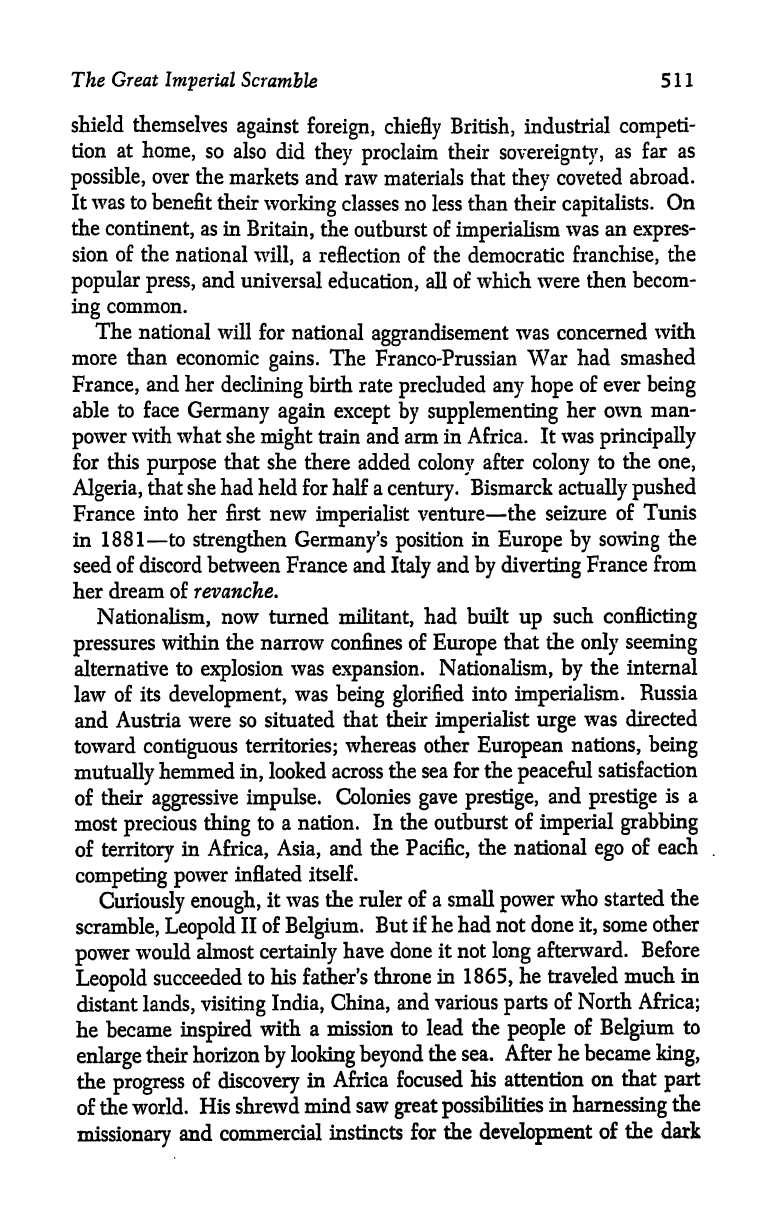
The
Great
Imperial
Scramble
511
shield
themselves
against
foreign,
chiefly
British,
industrial
competi-
tion
at
home,
so
also
did
they proclaim
their
sovereignty,
as
far
as
possible,
over
the
markets
and
raw
materials that
they
coveted
abroad.
It
was
to
benefit their
working
classes
no
less
than their
capitalists.
On
the
continent,
as
in
Britain,
the
outburst
of
imperialism
was
an
expres-
sion
of
the
national
will,
a
reflection
of
the democratic
franchise,
the
popular
press,
and
universal
education,
all
of which
were
then
becom-
ing
common.
The
national
will
for
national
aggrandisement
was concerned
with
more
than
economic
gains.
The
Franco-Prussian
War
had
smashed
France,
and her
declining
birth
rate
precluded
any
hope
of
ever
being
able
to face
Germany
again
except
by
supplementing
her
own
man-
power
with
what she
might
train and
arm
in
Africa.
It
was
principally
for
this
purpose
that
she
there added
colony
after
colony
to
the
one,
Algeria,
that
she
had
held for half
a
century.
Bismarck
actually pushed
France
into
her
first
new
imperialist
venture
the seizure
of Tunis
in 1881
to
strengthen Germany's position
in
Europe
by
sowing
the
seed
of discord
between
France and
Italy
and
by diverting
France
from
her
dream of revanche.
Nationalism,
now turned
militant,
had
built
up
such
conflicting
pressures
within the
narrow
confines of
Europe
that
the
only
seeming
alternative
to
explosion
was
expansion.
Nationalism,
by
the internal
law
of
its
development,
was
being glorified
into
imperialism.
Russia
and
Austria were
so situated
that their
imperialist
urge
was directed
toward
contiguous
territories;
whereas
other
European
nations,
being
mutually
hemmed
in,
looked
across
the
sea for the
peaceful
satisfaction
of
their
aggressive
impulse.
Colonies
gave
prestige,
and
prestige
is
a
most
precious
thing
to
a
nation. In the
outburst
of
imperial grabbing
of
territory
in
Africa,
Asia,
and
the
Pacific,
the national
ego
of
each
competing
power
inflated
itself.
Curiously
enough,
it
was
the ruler
of a small
power
who
started
the
scramble,
Leopold
II
of
Belgium.
But
if he had
not done
it,
some
other
power
would
almost
certainly
have done
it not
long
afterward.
Before
Leopold
succeeded
to his father's
throne
in
1865,
he
traveled much
in
distant
lands,
visiting
India,
China,
and
various
parts
of North
Africa;
he
became
inspired
with a
mission
to lead
the
people
of
Belgium
to
enlarge
their
horizon
by
looking
beyond
the sea.
After he
became
king,
the
progress
of
discovery
in
Africa focused
his attention
on
that
part
of the
world.
His
shrewd
mind
saw
great
possibilities
in
harnessing
the
missionary
and
commercial
instincts
for
the
development
of
the dark
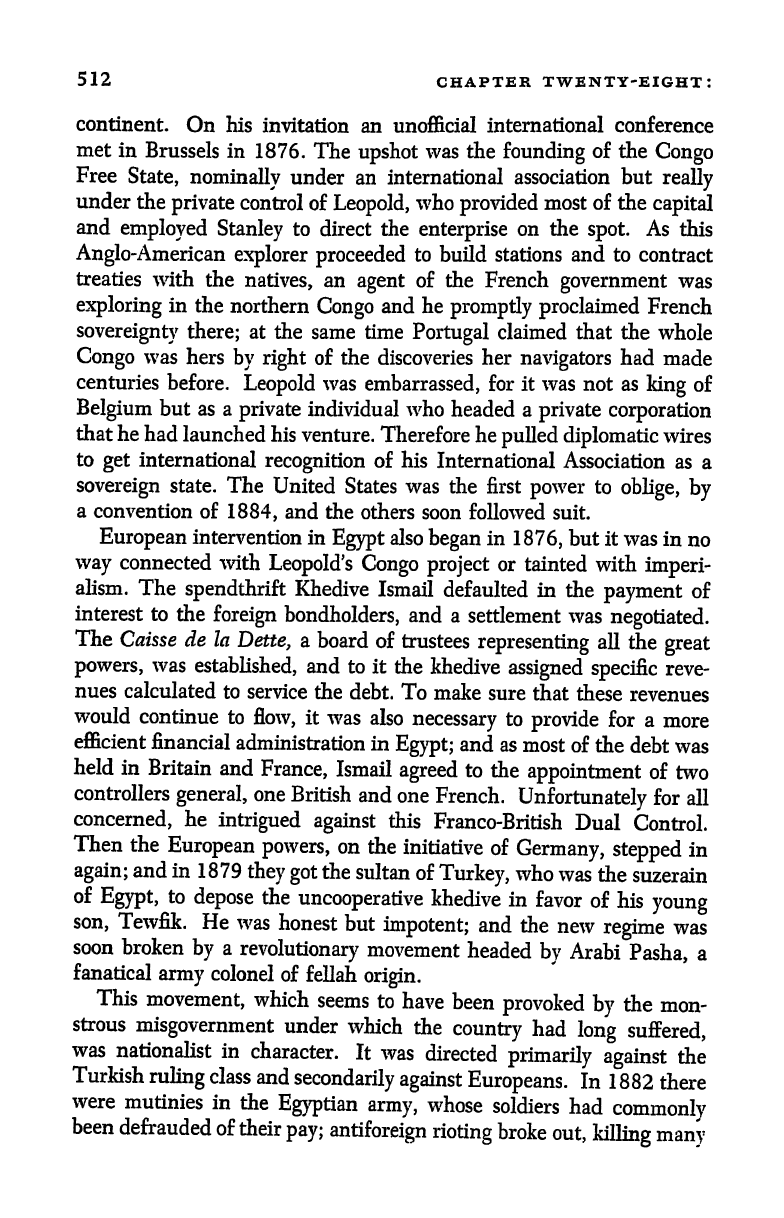
512
CHAPTER TWENTY-EIGHT:
continent.
On his
invitation an
unofficial
international
conference
met
in
Brussels
in
1876.
The
upshot
was the
founding
of the
Congo
Free
State,
nominally
under an
international association
but
really
under
the
private
control of
Leopold,
who
provided
most
of
the
capital
and
employed
Stanley
to
direct
the
enterprise
on the
spot.
As
this
Anglo-American
explorer
proceeded
to
build
stations and to
contract
treaties
with
the
natives,
an
agent
of
the
French
government
was
exploring
in
the
northern
Congo
and
he
promptly proclaimed
French
sovereignty
there;
at the
same
time
Portugal
claimed that
the
whole
Congo
was
hers
by
right
of
the
discoveries
her
navigators
had
made
centuries
before.
Leopold
was
embarrassed,
for
it was not as
king
of
Belgium
but as a
private
individual who
headed
a
private
corporation
that he
had
launched his venture.
Therefore he
pulled diplomatic
wires
to
get
international
recognition
of his
International
Association
as
a
sovereign
state.
The
United States was
the
first
power
to
oblige,
by
a
convention of
1884,
and the others
soon
followed suit.
European
intervention in
Egypt
also
began
in
1876,
but it was
in
no
way
connected
with
Leopold's
Congo project
or
tainted with
imperi-
alism.
The
spendthrift
Khedive
Ismail
defaulted in the
payment
of
interest to
the
foreign
bondholders,
and
a
settlement
was
negotiated.
The
Caisse de la
Dette,
a
board
of
trustees
representing
all
the
great
powers,
was
established,
and to it
the
khedive
assigned
specific
reve-
nues
calculated
to
service the
debt.
To
make
sure
that
these
revenues
would
continue
to
flow,
it
was
also
necessary
to
provide
for a
more
efficient
financial
administration in
Egypt;
and as
most
of
the
debt
was
held in
Britain
and
France,
Ismail
agreed
to
the
appointment
of
two
controllers
general,
one
British
and one
French.
Unfortunately
for
all
concerned,
he
intrigued
against
this
Franco-British
Dual
Control.
Then
the
European
powers,
on
the
initiative
of
Germany,
stepped
in
again;
and in
1879
they
got
the
sultan
of
Turkey,
who
was
the
suzerain
of
Egypt,
to
depose
the
uncooperative
khedive
in
favor
of
his
young
son,
Tewfik.
He
was
honest
but
impotent;
and
the
new
regime
was
soon
broken
by
a
revolutionary
movement
headed
by
Arabi
Pasha,
a
fanatical
army
colonel
of
fellah
origin.
This
movement,
which
seems
to
have
been
provoked
by
the
mon-
strous
misgovernment
under
which
the
country
had
long
suffered,
was
nationalist in
character.
It was
directed
primarily
against
the
Turkish
ruling
class
and
secondarily
against
Europeans.
In
1882
there
were
mutinies in
the
Egyptian
army,
whose
soldiers
had
commonly
been
defrauded of
their
pay;
antiforeign
rioting
broke
out,
killing
many
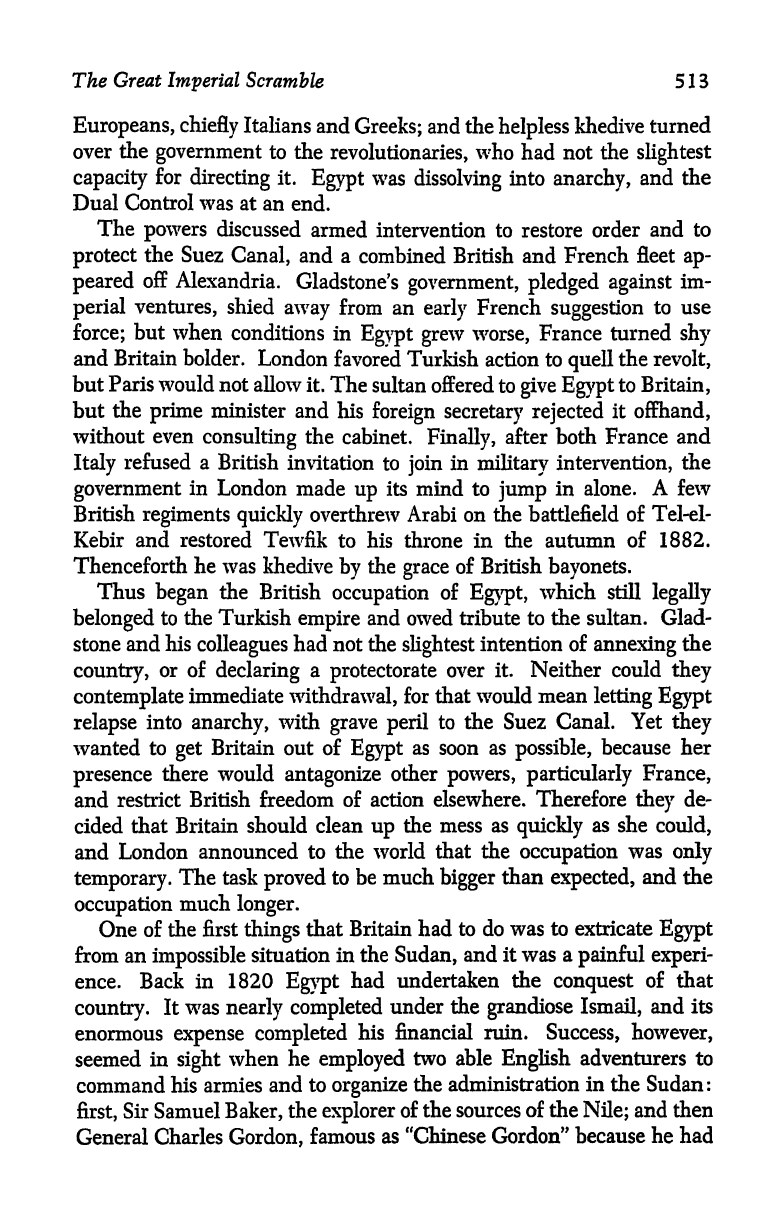
The
Great
Imperial
Scramble 513
Europeans, chiefly
Italians
and
Greeks;
and the
helpless
khedive
turned
over
the
government
to
the
revolutionaries,
who
had
not
the
slightest
capacity
for
directing
it.
Egypt
was
dissolving
into
anarchy,
and the
Dual Control
was
at
an
end.
The
powers
discussed
armed intervention
to
restore
order
and to
protect
the Suez
Canal,
and a
combined
British
and
French
fleet
ap-
peared
off
Alexandria.
Gladstone's
government,
pledged
against
im-
perial
ventures,
shied
away
from an
early
French
suggestion
to use
force;
but
when
conditions in
Egypt
grew
worse,
France turned
shy
and
Britain
bolder.
London
favored Turkish
action
to
quell
the
revolt,
but
Paris
would not
allow
it.
The
sultan
offered
to
give
Egypt
to
Britain,
but
the
prime
minister
and
his
foreign secretary
rejected
it
offhand,
without
even
consulting
the
cabinet.
Finally,
after
both
France
and
Italy
refused a
British
invitation
to
join
in
military
intervention,
the
government
in
London
made
up
its
mind
to
jump
in
alone.
A few
British
regiments
quickly
overthrew Arabi on
the
battlefield
of
Tel-el-
Kebir
and
restored Tewfik to
his
throne
in
the
autumn
of
1882.
Thenceforth
he
was khedive
by
the
grace
of
British
bayonets.
Thus
began
the
British
occupation
of
Egypt,
which
still
legally
belonged
to
the
Turkish
empire
and owed
tribute
to
the sultan.
Glad-
stone
and
his
colleagues
had
not
the
slightest
intention of
annexing
the
country,
or of
declaring
a
protectorate
over
it. Neither could
they
contemplate
immediate
withdrawal,
for
that
would
mean
letting
Egypt
relapse
into
anarchy,
with
grave peril
to
the
Suez Canal.
Yet
they
wanted
to
get
Britain out of
Egypt
as
soon as
possible,
because her
presence
there would
antagonize
other
powers,
particularly
France,
and
restrict
British
freedom
of action elsewhere.
Therefore
they
de-
cided
that
Britain should
clean
up
the mess as
quickly
as
she
could,
and
London
announced
to the world
that the
occupation
was
only
temporary.
The task
proved
to
be
much
bigger
than
expected,
and
the
occupation
much
longer.
One
of the
first
things
that Britain had
to do was
to extricate
Egypt
from
an
impossible
situation in
the
Sudan,
and
it was
a
painful experi-
ence.
Back
in 1820
Egypt
had
undertaken
the
conquest
of that
country.
It was
nearly
completed
under the
grandiose
Ismail,
and
its
enormous
expense
completed
his
financial ruin.
Success, however,
seemed
in
sight
when
he
employed
two able
English
adventurers to
command his
armies
and to
organize
the administration
in
the
Sudan
:
first,
Sir
Samuel
Baker,
the
explorer
of
the sources
of the
Nile;
and
then
General
Charles
Gordon,
famous
as "Chinese
Gordon" because he had
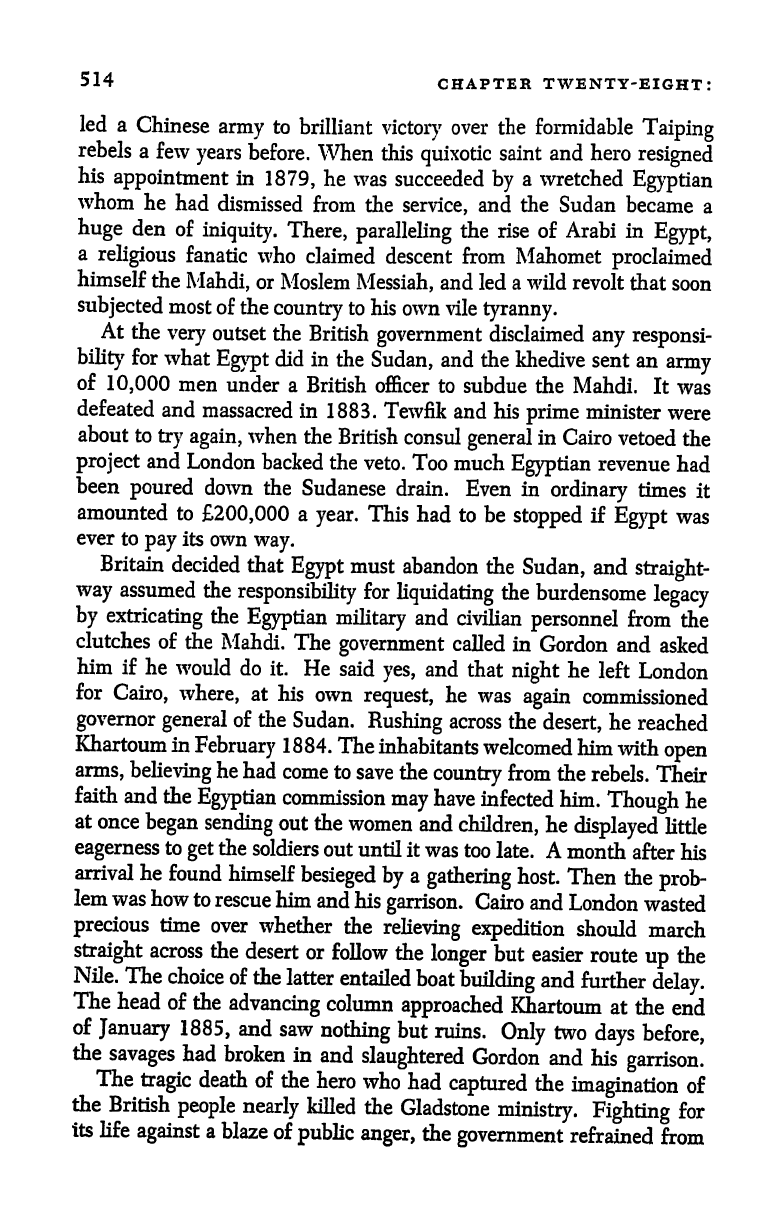
514
CHAPTER
TWENTY-EIGHT:
led a
Chinese
army
to
brilliant
victory
over the formidable
Taiping
rebels
a
few
years
before.
When
this
quixotic
saint and hero
resigned
his
appointment
in
1879,
he
was succeeded
by
a wretched
Egyptian
whom
he
had
dismissed
from the
service,
and
the Sudan
became
a
huge
den
of
iniquity.
There,
paralleling
the
rise of Arabi in
Egypt,
a
religious
fanatic
who
claimed descent from Mahomet
proclaimed
himself
the
Mahdi,
or
Moslem
Messiah,
and
led
a wild
revolt
that
soon
subjected
most
of the
country
to his
own vile
tyranny.
At
the
very
outset
the
British
government
disclaimed
any
responsi-
bility
for
what
Egypt
did in
the
Sudan,
and the
khedive sent
an
army
of
10,000
men
under a
British officer to
subdue the
Mahdi.
It
was
defeated
and
massacred
in
1883.
Tewfik
and his
prime
minister
were
about
to
try
again,
when
the
British
consul
general
in
Cairo
vetoed
the
project
and
London
backed the
veto.
Too
much
Egyptian
revenue
had
been
poured
down
the
Sudanese
drain.
Even
in
ordinary
times
it
amounted
to
200,000
a
year.
This
had to be
stopped
if
Egypt
was
ever
to
pay
its
own
way.
Britain
decided that
Egypt
must
abandon
the
Sudan,
and
straight-
way
assumed
the
responsibility
for
liquidating
the
burdensome
legacy
by
extricating
the
Egyptian
military
and
civilian
personnel
from
the
clutches
of
the
Mahdi.
The
government
called
in
Gordon
and
asked
him
if
he
would do
it.
He
said
yes,
and
that
night
he
left
London
for
Cairo,
where,
at
his
own
request,
he
was
again
commissioned
governor
general
of
the
Sudan,
Rushing
across
the
desert,
he
reached
Khartoum
in
February
1884.
The
inhabitants
welcomed
him
with
open
arms,
believing
he
had
come
to
save
the
country
from
the
rebels.
Their
faith
and the
Egyptian
commission
may
have
infected
him.
Though
he
at
once
began
sending
out
the
women
and
children,
he
displayed
little
eagerness
to
get
the
soldiers
out
until it
was
too late.
A
month
after
his
arrival
he
found
himself
besieged
by
a
gathering
host.
Then
the
prob-
lem
was
how
to
rescue
him
and
his
garrison.
Cairo
and
London
wasted
precious
time
over
whether
the
relieving expedition
should
march
straight
across the
desert
or
follow
the
longer
but
easier
route
up
the
Nile.
The
choice
of
the
latter
entailed
boat
building
and
further
delay.
The
head of
the
advancing
column
approached
Khartoum
at
the
end
of
January
1885,
and saw
nothing
but ruins.
Only
two
days
before,
the
savages
had
broken
in
and
slaughtered
Gordon
and
his
garrison.
The
tragic
death
of
the
hero
who
had
captured
the
imagination
of
the
British
people
nearly
killed
the
Gladstone
ministry.
Fighting
for
its
life
against
a
blaze
of
public
anger,
the
government
refrained
from
